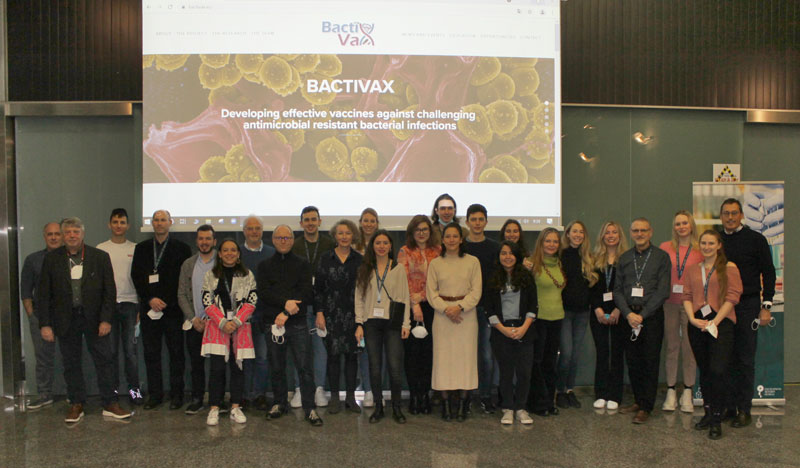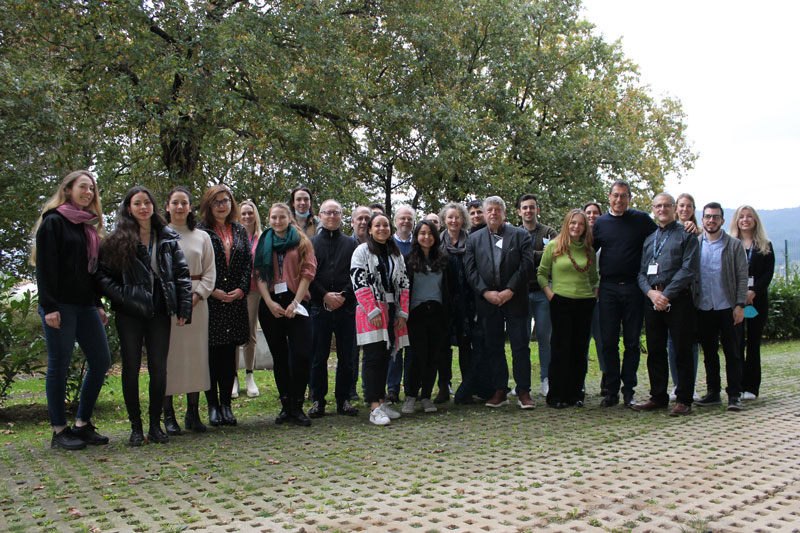
2021/11/23
Early-stage researchers receive training to develop innovative antibacterial vaccines
CIC bioGUNE is hosting the congress of the BactiVax Project, a European training network funded by the European Commission.
The BactiVax project brings together 14 world-class experts in vaccinology from 8 European countries to investigate vaccine development.
Antimicrobial resistance renders standard treatments ineffective, infections persist and may potentially spread.
CIC bioGUNE, a member of the Basque Research & Technology Alliance (BRTA), is hosting until Thursday, 25 November, the congress of the BactiVax Project, a European training network funded by the European Commission, with over EUR 4 million to provide high-level training in vaccinology to a new generation of 15 high-achieving, early-stage researchers. The aim of the BactiVax Project is to develop effective vaccines against antimicrobial-resistant bacterial infections.
The project brings together 14 world-class experts in vaccinology from 8 different European countries, including Jesús Jiménez-Barbero, Scientific Director at CIC bioGUNE, and Juan Anguita, principal investigator at the centre, to study complementary facets of vaccine development.
Antimicrobial drug resistance, or the ability of various microorganisms (bacteria, viruses and some parasites) to stop an antimicrobial (such as antibiotics, antivirals and antimalarials) from working against it, is a major challenge for mankind. This resistance renders standard treatments ineffective, infections persist and may potentially spread. Annual deaths resulting from antimicrobial resistance-related infections number around 700,000, and are forecast to rise to as many as 10 million by 2050. New antibiotics are not the solution to this problem, as bacteria can adapt and become newly resistant, so vaccination remains the most effective approach to prevent and treat infection.
As from yesterday, Monday, and for a period of 4 days, the early-stage researchers will receive training in state-of-the-art technology, both basic and applied, for the development of vaccines, including aspects related to the post-vaccination immune response. The event is also an opportunity for these early-stage researchers associated with the project to present their progress in the research conducted to date as part of the development of their doctoral theses.
Experts from all fields related to vaccine development are expected to participate in the programme, including Drs. Alberto Fernández Tejada and Nicola Abrescia from CIC bioGUNE, and Prof. Antonio Molinaro, from the Università degli Studi di Napoli Federico II, who is currently a visiting researcher at CIC bioGUNE and the UPV/EHU.
This is the first face-to-face meeting of the BactiVax Project, which was launched on 1 October 2019 and is scheduled to be completed by 2023.
In addition to researchers from CIC bioGUNE, participants in this European training project include researchers from University College Dublin, Queen's University Belfast, St George's Hospital, Imperial College London, LIONEX GmBH, ImmunXperts, Eótvóx Loránd University, Ludwig Maximillians University, the Italian Research Council, the University of Milano Bicocca and L'École Polytechnique Fédérale de Lausanne.
About CIC bioGUNE
The Centre for Cooperative Research in Biosciences (CIC bioGUNE), located in the Bizkaia Technology Park, is a biomedical research organisation conducting cutting-edge research at the interface between structural, molecular and cell biology, with a particular focus on the study of the molecular bases of disease, for use in the development of new diagnostic methods and advanced therapies.
About the BRTA
The BRTA is an alliance made up of 4 collaborative research centres (CIC bioGUNE, CIC nanoGUNE, CIC biomaGUNE and CIC energiGUNE) and 12 technology centres (Azterlan, Azti, Ceit, Cidetec, Gaiker, Ideko, Ikerlan, Lortek, Neiker, Tecnalia, Tekniker and Vicometch), with the aim of developing advanced technological solutions for Basque companies.
With the support of the Basque Government, the SPRI Group and the Provincial Councils of the three regional provinces, the alliance seeks to promote collaboration among its centres, to strengthen the conditions to generate and transfer knowledge to the business sector, thereby contributing to its competitiveness, and to spread Basque scientific and technological capacity outside of the Basque Country.
BRTA has a staff of 3,500 professionals, accounts for 22% of the Basque Country’s R&D investment, generates an annual turnover of over EUR 300 million and files 100 European and international patents per year.
See a large version of the first picture

See a large version of the second picture





